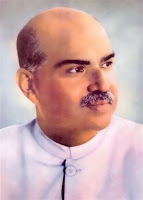Dr Ambedkar during Constituent Assembly Debates on Article 21 subject to " due process of law" and "procedure established"
ASSEMBLY OF INDIA DEBATES (PROCEEDINGS)-
VOLUME VII
Monday, the 13th December, 1948
Article 21 (Article 15 in corresponding draft constitution )
It is quite clear to any one who has listened to the debate that has
taken place last time that there are two sharp points of view. One point of
view says that "due process of law" must be there in this article;
otherwise the article is a nugatory one. The other point of view is that the
existing phraseology is quite sufficient for the purpose. Let me explain what
exactly "due process" involves.
The question of "due
process" raises, in my judgment, the question of the relationship between the legislature and the
judiciary. In a federal constitution, it is
always open to the judiciary to decide whether any particular law passed
by the legislature is ultra vires or intra vires in reference to the powers of legislation which are granted by
the Constitution to the particular legislature. If the law made by aparticular
legislature exceeds the authority of the power given to it by the Constitution,
such law would be ultra vires and invalid. That is the normal thing that happens in all federal
constitutions. Every law in a federal constitution, whether made by the
Parliament at the Centre or made by the legislature of a State, is always subject
to examination by the judiciary from the point of view of the authority of the legislature
making the law. The 'due process' clause, in my judgment, would give the judiciary
the power to question the law made by the legislature on another ground. That
ground would be whether that law is in keeping with certain fundamental principles
relating to the rights of the individual. In other words, the judiciary would
be endowed with the authority to
question the law not merely on the ground whether it was in excess of the authority of the
legislature, but also on the ground whether the
law was good law, apart from the question of the powers of the
legislature making the law. The law may
be perfectly good and valid so far as the authority of the legislature is concerned. But, it may not be a good law,
that is to say, it violates certain
fundamental principles; and the judiciary would have that additional
power of declaring the law invalid. The
question which arises in considering this matter is this. We have no doubt
given the judiciary the power to examine the law made by different legislative bodies on the ground whether that
law is in accordance with the powers given
to it. The question now raised by the introduction of the phrase 'due process'
is whether the judiciary should be given
the additional power to question the laws made
by the State on the ground that they violate certain fundamental
principles.
There are two views on this
point. One view is this; that the legislature may be trusted not to make any law which would
abrogate the fundamental rights of man, so
to say, the fundamental rights which apply to every individual, and consequently, there is no danger arising from the introduction of the phrase 'due process'. Another view is this: that it is not possible to trust the legislature; the legislature is likely to err, is likely to be led away by passion, by party prejudice, by party considerations, and the legislature may make a law which may abrogate what may be regarded as the fundamental principles which safeguard the individual rights of a citizen. We are therefore placed in two difficult positions. One is to give the judiciary the authority to sit in judgment over the will of the legislature and to question the law made by the legislature on the ground that it is not good law, in consonance with fundamental principles. Is that a desirable principle? The second position is that the legislature ought to be trusted not to make bad laws. It is very difficult to come to any definite conclusion. There are dangers on both sides. For myself I cannot altogether omit the possibility of a Legislature packed by party men making laws which may abrogate or violate what we regard as certain fundamental principles affecting the life and liberty of an individual. At the same time, I do not see how five or six gentlemen sitting in the Federal or Supreme Court examining laws made by the Legislature and by dint of their own individual conscience or their bias or their prejudices be trusted to determine which law is good and which law is bad. It is rather a case where a man has to sail between Charybdis and Scylla and I therefore would not say anything. I would leave it to the House to decide in any way it likes.




Comments
Post a Comment